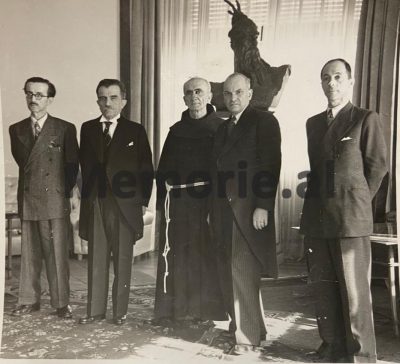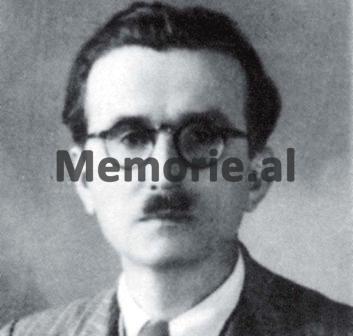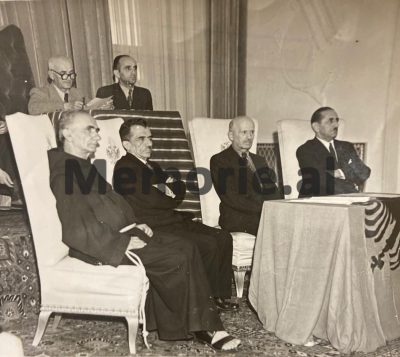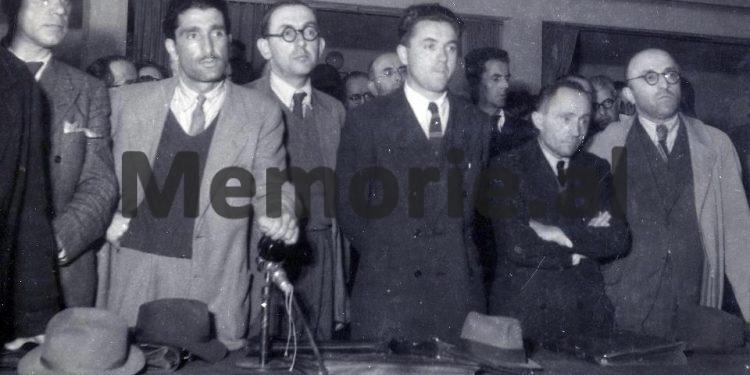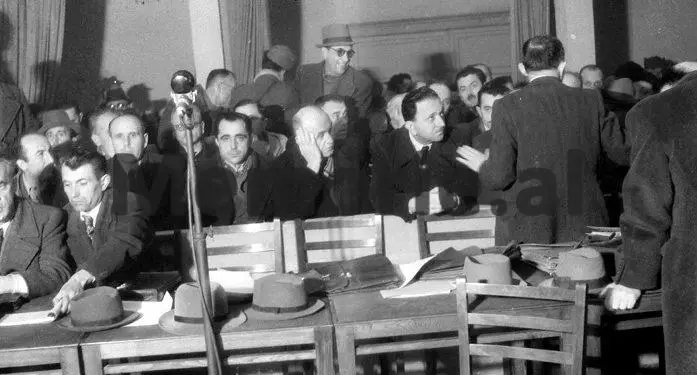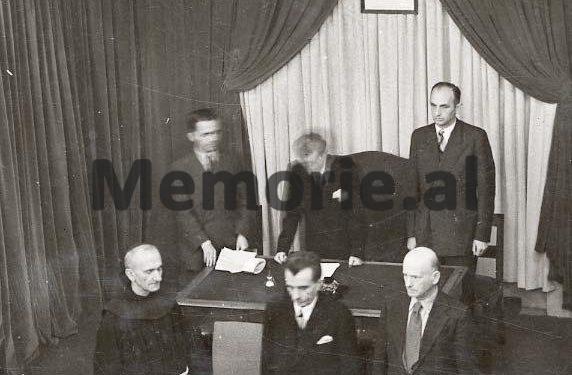By Ani JAUPAJ
– The confession of Mrs. Elsa Zallari, about her father, Mihal, and what Manush Muftiu said to her, when she went to complain to you, after she was fired?! –
Memorie.al / The daughter of the former Speaker of the Albanian Parliament, Mihal Zallari, after collecting her father’s documents, letters and poems during and before his imprisonment, shows today what she could not do until yesterday, her life and her longings for some justice. The past always comes to his mind in tears, just as he could not always chew the injustices. The only daughter of Mihal Zallari, now at an advanced age, returns in this interview to the past years, when she was only 9 years old, when her father was handcuffed, and she did not see him for 18 years “My father and all to those who chose the difficult and arduous path in the service of the Motherland, taking into account the consequences”.
This is the dedication found on the second page of the book “My father, Mihal Zallari”, written by his daughter, Elsa (Her real name is Elsa, despite the fact that, due to an error in the registration of documents, Elsa remained everywhere). Maybe then, years ago, when the father was an active part of the defense of patriotic ideas, neither the little daughter, nor her mother, Niqi, neither accepted nor supported the activities of the head of the family, because they probably knew how the thread would go. Whereas now, when Elsa has more than 80 years on her shoulders, despite the heavy memories she has behind her, she feels at least proud and arrogant, for everything she saw and heard about her father.
She did not write a book about his life, including herself. “Speaking as my daughter is not very comfortable, because my interpretations cannot escape feelings, that’s why I simply collected all the materials I managed to secure from his time and put them together in the book”. Elsa was an only girl, she had neither brothers, nor sisters, nor any relatives who could help her to “mess up” in distant history. “Therefore, the only solution was to do all this work himself. As soon as he retired and was given the opportunity to access the archived documents of the State Archives, he started working”, she says. In the drawers of her house there were also letters and notes that revealed her father’s past.
In each of them, the history, the data spoke for themselves, that’s why she also preferred not to include analysis or comments, but to present, as it was, the truth. However, all those who have had the chance to get hold of this book (mostly friends and relatives), know that its emotional part is missing. Also because it is not easy for her to share her personal emotions with others.
At least, not without creating disturbances in her feelings, sleepless hours, and the bitter taste that brings back a past that neither she nor any of her family members deserved. It was not easy to talk to Elsa, without being interrupted from time to time by the tears that weakened the power of her voice. Not that her story is one of the worst you’ve ever seen or heard, NO. Elsa denies this. It’s just that everyone has their own experiences about the past.
There are memories of a life in which she was always alone against injustices, however, stubborn to take her rights to the end, without ever backing down. All these obstacles, during the 18 years of the prison of her father, Mihal Zallari, and all the subsequent time, she has never shared with others.
How many times have I started to write memories, feelings… they have remained on pieces of paper scattered in the corners of the furniture of the house, without becoming soil. Others have also tried to push her to confess the difficult years, but so far she has decided to keep them to herself. Taking out with difficulty and with much regret even these small fragments of her life.
Ms. Elsa, what do you remember as the most unwanted moments of that time?
The first and saddest are his eyes in the last moments, before he passed away. They were sad, painful eyes, it is the only image that I could not and will not be able to forget, even though so many years have passed. I read in him regret, which was not for him, but for others, for the whole country. He was an honest man, in the purest sense of the word. Whatever I did in his trust, I was never disappointed. It always happened like that, and as he said “sincerity is a need of the soul”.
How old were you when you were imprisoned?
It was 1944 and I was 9 years old.
What are the consequences of the memory of a child who sees his father arrested?
I have not seen this scene, because he and his colleagues were in Shkodër, when they were arrested. So the experiences were at a later stage.
Mihal Zallari was the speaker of the Albanian Parliament at the time of the German occupation, so he must have had a certain fear or threat constantly… Or was all this not conveyed to the child?
In our house, nothing was kept secret. Even though I was small and couldn’t understand things well, I still understood them, and then the interpretation was mine. The mother had always asked the father not to get involved in politics because she was sure that one day the consequences would come. Even he knew it and yet, he refused to fulfill her request, except to be in the service of the motherland.
“Now they need me”, he said. Several times warnings had come to the house, they had sent words to stay away from politics, but they fell on deaf ears. Moreover, the president of the previous Parliament had been killed. He could also have this ending. In fact, they did not kill him, they imprisoned him.
Mom, did anything reflect on you during this time?
She only had one regret: “How did you leave us here”? – he always said. “He knew the consequences, I and others had asked him not to get involved.”
How did you get involved in politics?
My father studied in Istanbul from the age of primary school until he finished high school, but he was in a German school. Even after that, he completed his university studies in Austria. During all the time he was away, he was never separated from the interests of the homeland, and the weekly “Djalëria” (1922-1924) is proof of this. He finally returned to Albania in 1925. He worked as a teacher for some time, from whose students I have received some data and memories.
Then with the capitulation of Italy and the arrival of Germany, the language he knew well and the whole German culture with which he had grown up, made him a contender for them, to put him at the head of the Parliament. In addition to the fact that the situation was difficult, several other names had been proposed to be in his place, but no one had accepted. They even told the father orally; “we will kill you too”. His answer was: “If you like this, kill me”! When this threat failed to turn his mind, surely nothing else could.
At least this time, your life has been good, or…?
Life before the invasion was relatively good; we lived at my grandfather’s house. Then it was freed for the Italians and at the time when Durrës was evacuated, we were looking for a house to rent, but the large number of people meant that all the houses were occupied, so we lived, despite my father’s position, only in a room, until the house was freed from the Italians.
What about from your childhood, from your school days, do you keep any good memories or not?
What can I remember; it was such a short time, of a redeemed childhood, moreover, very distant. I remember the conversations they had between friends. We used to hear the word communist at home or around, which was immediately related to the good of the country, and we asked each other: “What is your father, communist or ballistic”?! That my father was not a ballistician, I knew that well, as far as I understood then I answered, that my father was a communist. By my logic, as long as both he and the communists aspired for the good of the country, that means he was a communist. Later I realized that he was just a patriot. He loved his country and people, their good things.
What changed in your life after his imprisonment?
I continued to go to school while my mother learned to sew in order to earn some income. Later, she was forbidden to do this too, so she ended up in construction, together with some of her friends, whose fathers or husbands were in prison. Someone had been arrested, for example, because he made a good defense in the ‘Special Trial’. So he was a lawyer and ended up in prison.
This group of women worked on the construction of the Shallvare palace. I remember that they also knitted a song, which I asked my mother to bring home. A verse of that song was “For you, friend, there is no work, except work with pickaxes”. This was the daily refrain of those innocent young women. Then I enrolled at the Polytechnic. I went willingly, because my mind lied to me, that I would pursue engineering afterwards.
Actually…?!
I actually didn’t get to finish that either. Year after year, at school we heard about student exclusions for political reasons. It was my turn in the third year. After the exclusion, I was taken to work for 5 years at the Shqopa factory, until I happened to meet a friend of my father’s, who told me that we could take a test for the Construction Technical College.
So, I started school again, sewing at night, because my mother was sick and was no longer able to work. After that, I graduated from technical high school and worked at the “21 December” Construction Company. Later, because at that time it was impossible with all the requirements, I did the night Institute for Mathematics-Physics.
During this time, you also created a family. Was your husband part of your ‘circle’?
No, on the contrary, it had nothing to do with the “spots” that were branded on people in biographies.
How possible was this…being “immaculate” that he could be seen differently when he related to you?
It is true and in fact he was harassed at work. He was an engineer, they could not remove him from work, but they did everything possible to make it difficult for him. However, I have never felt this, neither from him nor from his family. None of them ever said anything that could upset me. Unlike my friends, who told me that even the chickens in the coop knew that they had a ballistic father?
And what happened to your father in the meantime, did you go and visit him?
Not only at this time, but always. My school receipts went to him every year. Even though I have always been a bit frugal with letters. At first we went every week because it was close, but when he was transferred to Burrel, I could only go when I got the usual leave. When I gave birth to my daughter, I went with my husband and my daughter, so that the father could see and get to know his granddaughter. We tried to help him as much as we could, even though the truth is in prison, it’s not that they burdened him with heavy work, he was treated well. He wrote poetry, read.
How was facing reality when it came out? Everything around had changed…! What did he himself do?
When he left, he left a little girl, while now he was looking for granddaughters, almost that age. You said from the beginning that I can’t forget your eyes when you passed away. They were very painful and full of regret. These feelings accompanied him all the time, despite the fact that he was not a complaining person, he kept everything to himself. When my father was released from prison, he worked at the Institute of History. However, even the years in prison had not been so difficult for him, what was the reaction of the people.
The situations in Albania changed year after year, what about you, were you “harassed” anymore?
Constantly. In the years ’68, -, ’69, it was the fight against the bureaucracy. For 5 years, I had been a teacher, but after this year, I was taken to agriculture. But I didn’t sit still. I have done my share; I have always sought the right. At this time, I went to Manush Mufti, to whom I asked for explanations about the removal as well as my rights. “I don’t guarantee your education,” he said, “but go, we’ll fix it” and they took me to “December 21” again. Of course, it didn’t end there; they brought me back to construction, where I worked for another 15 years, until I retired in 1990.
The trial of Mihal Zallari
The chairman, after asking the accused about his generalship, sang the indictment of the Central Commission for War Crimes Investigation: “You inspired and organized the Provisional Executive Committee, the Assembly, from which emerged the Regency and the first Quisling Government during Nazi occupation, all these Institutes, which facilitate the actions of the occupier.
In your capacity as Speaker of the Parliament, by not opposing and protesting by resigning, you have approved the terrorist acts of the Quisling government, the regency and the occupier. You have become a tool of enemy propaganda, propagandizing for National Socialism. Being in agreement with the occupier, you betrayed the people’s struggle. What do you have to say?
Mihal Zallari: In my opinion, against the honor and the Nation, I have not done anything and I have not been a tool of the enemy. Everything I have done, I have done with conscience and I have been free, in my thoughts. I do not deny that I was a member of the Executive Committee and how the Albanian world understands this, I do not care, but I only say that I was for the good of Albania and not to serve the Germans.
The Albanian world has stamped me as a pro-German and it is true. I did primary, secondary and high school there. I have sympathy for the social system, music, art, literature, for the writers who defended Albania’s thesis, but I am not a National Socialist.
President: you took the initiative for the formation of the Assembly and proclaimed in that meeting the independence and neutrality of Albania under the German occupation?!
Mihal Zalalri: When the German came here, the people faced two alternatives: either they would accept the previous situation, with those people who cooperated with Italy, or without forming the Executive Committee, accept the military dictatorship.
Chairman: What was your position, your thesis, in the service of the National Liberation War, or of the Germans?
Mihal Zallari: Personally, I considered it harmful, the division during wartime, I didn’t like fratricide and then I defended the thesis in favor of the people that Albania came out of the war against the allies.
Chairman: You were a philo-German fanatic, your group when Germany was winning, when they were close to Moscow and Alexandria, you tried cups, for the victory of the Germans.
Mihal Zallari: I said my point of view before.
Prosecutor: Let the accused tell us what he means by the word independence, what did he do in September, when the Germans came, what forced him to write articles against the National-Liberation movement as being sold to foreigners?
Mihal Zallari: Independence, I understand freedom of conscience, in September I participated in the Executive Committee and in the Assembly, with my articles, I have not called the people of the movement sold out, and as much as I wanted from the beginning duals like the Communist Party, I still had conviction, that it was a national movement.
(The prosecutor analyzes his articles on boyhood, which he praises in the hope of bringing him closer, away from the war)
Chairman: Do you believe in the victory of the allies?
Mihal Zallari: At first I had faith, but when the Germans came here, I lost faith and with all this I became the fifth colony of the Albanian people, but not the fifth colony of the Germans.
Chairman: You asked the boys to come from the mountains and not fight. Who did you serve with this deed?
Mihal Zallari: I was thinking in that direction and remembered that I served the people.
Chairman: Mehdi Bey gave money to Kadri Cakran and Hysni Dema and Abaz Kup?
Mihal Zallari: Yes. I don’t know how much he gave them.
Chairman: What relations did Mehdi Beu have with Balli and Legality?
Mihal Zallari: I don’t know, but Mehdi Bey, he is a confused type, but I can’t call him a traitor, how can I not accept Ibrahim Bickaca being called a traitor, since he is an honest man. And in my opinion, there can’t be thousands of traitors in a nation as small as ours./Memorie.al




